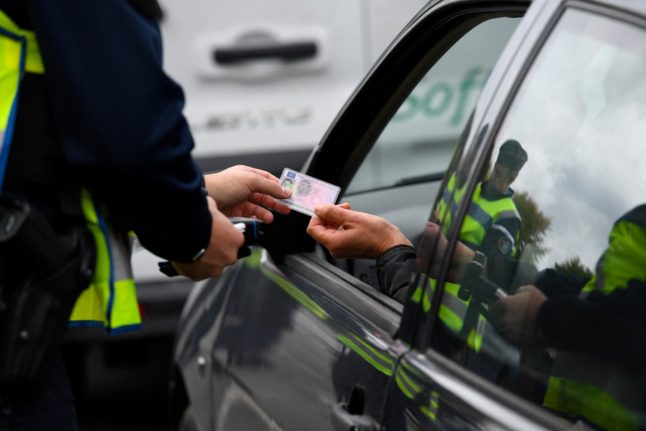Among the more than 100 people who responded to our survey, 97.3 percent said that they had been hit by duty fees on packages sent to France.
For some readers, these unexpected costs came as a nasty surprise.
Jane Vallet had to fork out €7.50 to pick up a birthday card and bar of chocolate from the post office.
Graham Hilton had to pay €650 to receive a set of alloy car wheels which he had already purchased for more than €1,300 (postage included), while Bryan Woy had to splash out €10 for a free tote bag sent to him as a reward for taking out a magazine subscription.
Many readers of The Local have reported having to pay customs duties that often work out as being at least half the cost of the value of the package itself.
This has put many off postage altogether. “Don’t send anything!” wrote Jill Brown.
“We have now asked friends and family not to send gifts from the UK because of the duty imposed,” added another reader.
EU rules
For people receiving packages from the UK (close to 70 percent of those surveyed), this is a relatively new phenomenon.
READ MORE New rules and extra charges in sending parcels between UK and France
Before Brexit, duty fees did not apply because the UK was part of the EU.
Now, as well as having the appropriate postage, all items apart from documents sent from England, Scotland and Wales to the EU need an extra customs declaration form attached.
This form asks for the sender and recipient’s details, whether the item is a gift or an item sent for sale (which affects the level of duty for some countries) and a detailed description of what is in it – so birthday or Christmas parcels slightly lose their element of surprise. The form is available to download here.
Outside the UK
People sending packages from other non-EU countries, such as the United States, Canada and Australia, have always had to deal with duty fees and customs declarations, but several American readers also reported being hit with unexpectedly high fees.
From July 1st 2021, all goods shipped to the EU from all non-EU countries were subject to VAT. Before this, such a rule only applied to goods worth €22 or more. Officially, this rule does not apply to commercial goods. According to La Poste, you can pay any VAT fees before or upon delivery.
Gifts
In theory, if the parcel is marked as a gift with a value of less than €45 (excluding VAT), you will not have to pay customs duty. Goods purchased from online retailers and sent from outside the EU with a value of less than €150 should also not require a duty fee.
In reality, many of our readers say they are still being hit with these extra costs.
When it comes to saving money on duty fees, this was your advice:
Get visiting friends or family to bring goods in person
Judy Lindsay outlined the most obvious way to avoid paying customs duty on packages.
“Have friends bring you what you need in their suitcase when they come for a visit,” she said.
Any traveller over the age of 15 coming to France from outside the EU or EU customs area by sea or air has the right to bring €430 worth of items purchased as goods or received as gifts, without paying any duties.
Multiple people cannot group together to pool their allowance to bring a single expensive item exceeding a value of €430 into France without customs charges. Personal belongings do not count towards this €430 limit.
Bear in mind however, that items such as foodstuffs (including chocolate) cannot be brought into the EU from non-EU countries.
Use EU websites for online shopping
Another key way to avoid paying duty fees is to only order goods from EU-based retailers, such as Irish firms.
“If you reside in France don’t buy anything from outside EU,” said Chris Hebden.
This is because are no duty fees on packages sent between countries that form part of the EU customs union.
“Use the local Amazon or other web delivery service,” wrote Elizabeth Nicolet.
Be careful though, some EU websites have suppliers that are based outside the customs union in places such as the UK. In this case you will potentially be landed with a duty fee. If possible, always check where your package will ultimately be posted from before ordering.
Obviously it is impossible to predict if or when a friend or family member is planning to send you a package in France. However, if you have a suspicion that they intend to send you a gift (perhaps a birthday is coming up for example), you could always ask for them to order you something from a French or EU website.
Undervalued shipments
The duty you pay is based on the value of the item listed on the customs declaration form.
While it might be tempting to undervalue the parcel, it is actually illegal – you are effectively evading tax. Your package could be confiscated and the sender might end up with a €1,500 fine.
Scams
Unfortunately, the ubiquity of customs fees has also lead to an explosion in scams where people receive an email or text informing them that their item has arrived but has a duty fee which can be paid by opening the link and putting in your credit card details. Do not do this, only pay fees to La Poste or to a company when ordering items online.



 Please whitelist us to continue reading.
Please whitelist us to continue reading.
The EU protectionist ? Non ! Going to end up the World’s biggest trading cul-de-sac.
UK has import fees too.
I find it odd that if travelling by air or sea, the allowance coming into France is €430, whereas using the Eurotunnel, the allowance is only €300. I wonder why that is.
Welcome to the import and export to Europe market of the pre-mid 70s. It comes as a shock to all those that have never experienced it before, you were warned but decided to believe idiots like Farage instead. Americans and Australians have experienced it for years, but don’t keep whinging about it.
I just picked up a Christmas parcel sent from Australia and had to pay €12 in VAT and La Poste admin charges. So much for gifts and low-value parcels being exempt – this one ticked the box on both, and I still copped fees. 18 months ago I wasn’t incurring charges at all for receiving parcels from Australia.
We are based in France selling luxury but affordable bed linen http://www.lachambreparis.com. We ship internationally and and do ship to the UK but the costs and paperwork are really prohibitive.
There is a big problem where if you quote the value of the package including the VAT in France then both the duty 12% and the VAT 20% (if valued over 150 EUROS) get charged on whatever the total is you put on the package when it arrives in the UK plus a fee of c 12 GBP for the customs processing. If you have already paid VAT on a product in the UK or France then you should put the value as the Price – VAT when you are sending whether it is a gift or a commercial purchase.
You can send dark chocolate to the EU but not milk chocolate, even if it was made in the EU !!!
Of course we moan about these new rules because nearly half the UK voted to remain in the EU !
My wife, who is French, and I live in California. Whenever she sends family & friends gifts, (even a knitted sweater for a newborn nephew!), her family or friends call back about having to pay a ton to get the parcel out of postal jail. What a sham!
Beware of using Amazon.fr. I purchased a 9.98€ item and was charged 9€ in import fees. My mistake was in not noticing that the item was being sent from a non-EU country!
We live in Italy and are experiencing many of the problems listed above. Since around November 2021, the postal delivery has been slow. We just had a Christmas card delivered (posted 1st December – arrived 3rd February) for which we had to pay € 2.42 – a customs form had been attached! but no value had been included so a forfait.
I have a fortnightly subscription and suddenly was paying € 2.42. This is now sorted as it had to have a registered number (no, I don’t know either) included to allow free passage.
My tips are:
* Ask family and friends to stop sending cards. Use one of the e-card companies. Though not as personal, at least they arrive on time and don’t cost anything beyond the initial minimal subscription.
* If you have to buy goods from a UK site, try and choose one of the bid names. We’ve had good experience with both Amazon and M&S, but this may because their goods are sourced within the EU.
* Access multiple Amazon sites. Often you find something you want and if you search on the .it, .fr, .de site the same product is available at roughly the same price.
* Look into local websites.
* Keep a scratch list of things you want; yes, it does require some planning and either get visitors to bring them over or have them delivered to a UK address and collect when you are over.
As Boggy says above, welcome to 1972 when I first went to work on the continent. UK joined in 1973 and things got easier until now.
I have found sending anything other than letters or cards through the French postal system unreliable. My first effort to send a parcel via USPS to France from the US arrived in France and was returned intact and undelivered. The time for letters arriving has recently improved but generally remains unreliable. I have sent as little as possible the past year and have when necessary paid the hefty cost of a DHL shipment. The funny thing is that France seems to pride itself on a service that is at best erratic.
Is there any way to force routing via Ireland (as opposed to GB) when sending to Northern Ireland?
The situation with Britain leaving the EU has made all the imports and exports more complicated.
It’s not just foreigners though is it, it is anyone in Europe importing goods from third countries natives and immigrants (uk nationals or as they prefer it expats).
Those are the rules if you import from outside the European Union, you pay the duty, well known and widely discussed during the Brexit debates and widely ignored by numpty brexiters as fake news.
Why all the whinging. The tariffs have been known about for years and are very easy to work out. It’s not as bad as it was pre 70s, so all you whingers count yourselves lucky you didn’t own businesses then. The UK is now classified as a third country like America and Australia always have been, get use to it and stop blaming La Poste, the blame is solely down to all you people that voted to leave.